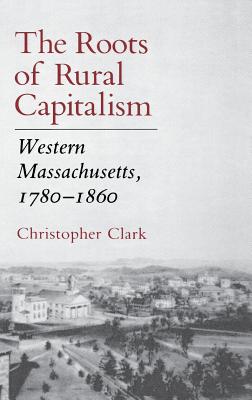

 Cornell University Press
Cornell University Press
The Roots of Rural Capitalism: Western Massachusetts, 1780 1860


Key Metrics
- Christopher Clark
- Cornell University Press
- Hardcover
- 9780801424229
- 9.25 X 6.12 X 0.98 inches
- 0.06 pounds
- Business & Economics > Economic Conditions
- English
 Secure Transaction
Secure TransactionBook Description
Between the late colonial period and the Civil War, the countryside of the American northeast was largely transformed. Rural New England changed from a society of independent farmers relatively isolated from international markets into a capitalist economy closely linked to the national market, an economy in which much farming and manufacturing output was produced by wage labor. Using the Connecticut Valley as an example, The Roots of Rural Capitalism demonstrates how this important change came about.
Christopher Clark joins the active debate on the transition to capitalism with a fresh interpretation that integrates the insights of previous studies with the results of his detailed research. Largely rejecting the assumption of recent scholars that economic change can be explained principally in terms of markets, he constructs a broader social history of the rural economy and traces the complex interactions of social structure, household strategies, gender relations, and cultural values that propelled the countryside from one economic system to another. Above all, he shows that people of rural Massachusetts were not passive victims of changes forced upon them, but actively created a new economic world as they tried to secure their livelihoods under changing demographic and economic circumstances.
The emergence of rural capitalism, Clark maintains, was not the result of a single transition; rather, it was an accretion of new institutions and practices that occurred over two generations, and in two broad chronological phases. It is his singular contribution to demonstrate the coexistence of a family-based household economy (persisting well into the nineteenth century) and the market-oriented system of production and exchange that is generally held to have emerged full-blown by the eighteenth century. He is adept at describing the clash of values sustaining both economies, and the ways in which the rural household-based economy, through a process he calls involution, ultimately gave way to a new order. His analysis of the distinctive role of rural women in this transition constitutes a strong new element in the study of gender as a factor in the economic, social, and cultural shifts of the period.
Sophisticated in argument and engaging in presentation, this book will be recognized as a major contribution to the history of capitalism and society in nineteenth-century America.
Author Bio
Christopher Clark was educated at Sydney Grammar School from 1972 to 1978, the University of Sydney (where he studied history) and the Freie Universität Berlin from 1985 to 1987.
Clark received his PhD at the University of Cambridge, having been a member of Pembroke College from 1987 to 1991. He is Professor in Modern European History at the University of Cambridge and, since 1991, has been a fellow of St Catharine's College,[3] where he is currently Director of Studies in History. In 2003, Clark was appointed University Lecturer in Modern European History and, in 2006, Reader in Modern European History. His Cambridge University professorship in history followed in 2008.[4] In September 2014 he succeeded Richard J. Evans as Regius Professor of History at Cambridge. In the birthday honours of June 2015, Clark was knighted on the recommendation of the foreign secretary for his services to Anglo-German relations.[2]
Clark's research interests are centred on the history of nineteenth-century Germany and continental Europe. His early work focused on the political and cultural history of religion. His first book was a study of the relationship between Christians and the Jewish minority in Prussia between 1728 and 1941; here he explored the ways in which contemporary understandings of Christianity shaped successive mutations of the 'Jewish Question'.
Since then he has published various articles and essays on related subjects - some of them examine the trouble that results when the state authority takes the initiative in religious questions, others look at the ways in which questions of religious allegiance were implicated in processes of political and cultural change. In 2004 he co-edited, with Wolfram Kaiser of the University of Portsmouth, an edited volume about the 'culture war' between Catholic and secular social forces that polarized so many European states in the years 1850-1890.
In the meanwhile, he has published a study of Kaiser Wilhelm II (2000) for the Longmans/Pearson series Profiles in Power and completed a general history of Prussia for Penguin, due out in spring 2006.
He is currently working on a study of political change across Europe in the aftermath of the 1848 revolutions.
Source: University of Cambridge Faculty of History and U.K. government documents
Videos








Community reviews
Write a ReviewNo Community reviews